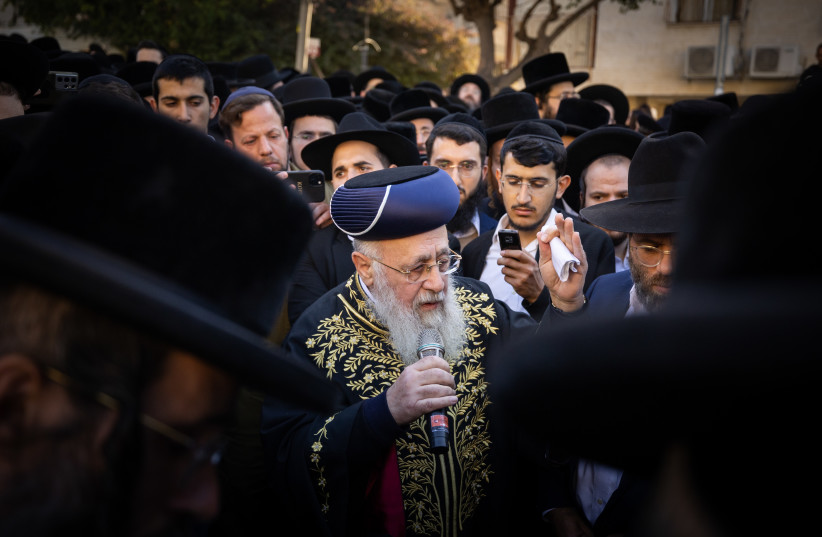Rabbi Yitzhak Yosef, the chief Sephardi rabbi of Israel, recently threatened a mass exodus of the ultra-Orthodox community if any of its members were conscripted. For those who don’t know the inner workings of the Israeli Defense Forces, it mandates two to three years of army service for all 18-year-olds. This has been the reality almost since the birth of the country. But around that time, there was only a small number of ultra-Orthodox citizens, and the decision was made to exempt those individuals from military service.
This community has significantly expanded since the late 1940s. However, the exemption law has not been repealed or amended. It has often been a topic of discussion in the Knesset and every time the subject is broached rioting breaks out in different areas of the country.
The issue we now face is a potential war of attrition in the South, coupled with an expansion of the effort in the North. The country faces an existential threat and is in dire need of reinforcements.
There are many in the ultra-Orthodox community who have taken up this call voluntarily. They have joined their non-religious brothers and sisters in arms, and they should be commended for doing so. But the overwhelming majority have not; and to add insult to injury, the recent statements of the Sephardi chief rabbi seem to spit in the faces of our brave soldiers.
The real question is: If this segment of Israel’s population were to leave, where would they go?
Haredi Conscription: Safety Concerns
If the country’s conscription was expanded, and the haredi community took Rav Yosef’s call to action literally, where would these men and women settle? I realize they live very insular lives, but have they not heard of the rampant, worldwide antisemitism which appears to be increasing? For example, there is a good deal of talk about London being a no-go zone for Jews. The anti-Israel movement is also becoming increasingly violent and more emboldened every day. Do the ultra-Orthodox think they’ll be safe in places like that?
What’s apparent in Europe and the majority of the West is that it’s once again in vogue to openly hate Jews. From common citizens to government representatives, no one is coming to our defense. The streets are overrun with Hamas sympathizers who want nothing more than the Jewish people’s demise.

How does the chief rabbi plan to protect himself and his community abroad? One can’t run from our enemies. In fact, Hamas would be ecstatic if all of the citizens of Israel heeded the chief rabbi’s call and picked up and left. We’d be handing them the country on a silver platter.
Jewish defense is the reason I made aliyah. The most inspiring aspect of our homeland is our ability to protect ourselves and the Jewish people as a whole. It’s what we were unable to do for 2,000 years. As frightened as I am of the day my own children’s army service arrives, I also know it will be one of the proudest days of my life.
A common refrain among the haredi community is that studying Torah is a better defense of the Jewish people than picking up a gun. From a theological standpoint, I understand the sentiment. Many of us who don’t consider ourselves part of the haredi community do believe that acts such as prayer, learning, and loving-kindness are ways to ensure the well-being of our nation. But it’s not the only thing that can or should be done.
If God forbid, a family member of my family suffered from an ailment that required an operation, I would ramp up those three religious courses of action in the hopes of a positive outcome. I’m sure it would also help alleviate my sense of helplessness. But I’m not a surgeon. If the doctor we chose outlined the course of treatment that only entailed prayer, he or she would promptly lose our case – and for good reason.
There’s an old joke about a man named Moshe who lived his whole life as a devout Jew. As his days were nearing their end, he prayed to God to win the lottery. When he died penniless, upon meeting his Maker, he beseeched the Almighty, saying, “God, I was a frum Jew my whole life, and never asked for anything except this. Why didn’t you grant me this one wish?” God answered saying, “Moishele, why didn’t you buy a lottery ticket.”
Ours is not a religion of faith alone. We are meant to take action in times of need. Prayer, learning, and good deeds have their place but they are not the only answer to our problems.
And just as the surgeon is meant to perform the necessary operation, able-bodied haredi men and women are meant to serve their country.
Protecting our land and our people is not just a duty, it’s the greatest honor any one of us can fulfill.
The writer is a rabbi, a wedding officiant, and a mohel who performs britot (ritual circumcisions) and conversions across the world. Based in Efrat, he is the founder of Magen HaBrit, an organization protecting the practice of brit milah and the children who undergo it.
